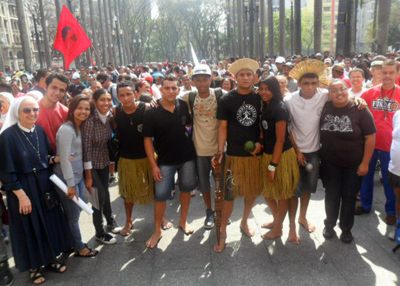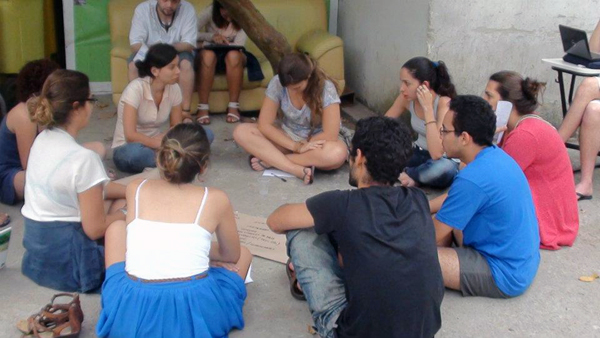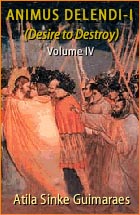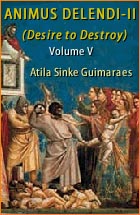Consequences of Vatican II
 |
 |
 |
 |
 |
 |
 |
The Progressivist Sect & Vatican II – Part I
The Spirit of Liberty Infiltrates the Church
In 1943, Plinío Corrêa de Oliveira published the prophetic book In Defense of Catholic Action. (1) Updated and enlarged by him in 1953, it became a fine catechism (2) countering Neo-Modernism or Progressivism, which took root in Brazil in the 1932-1943 period.
Briefly said, the Progressivist Sect applied its ideology - the diabolical trio of the French Revolution: liberty, equality and fraternity - to the Catholic Church.
Liberty
Catholic Liberalism was characterized by the rejection of traditional, long-established norms on instruction and education, which had been cut in stone and distilled through a long history of Catholic wisdom.
Such instruction included fleeing from the near occasion of sin, not exposing oneself voluntarily to temptations, combating disorderly tendencies, making frequent examinations of conscience and confessions, and practicing penance and mortification.
Supposedly, the mandate given to Catholic Action (CA), with its fascinating ideals and its participation in the sacred liturgy, would be enough to free its members from the need to control their passions and make efforts for their personal sanctification.

 In other words, this would be the marvelous vaccine against the seduction of the world, the flesh and the Devil.
In other words, this would be the marvelous vaccine against the seduction of the world, the flesh and the Devil.
This alleged irresistible “grace of state” of the CA apostle supposedly dispensed him from the need for an interior life and practically denied the vital free cooperation of man with God.
Under the pretext of the “apostolate of infiltration,” Catholics entered into worldly environments “in order to convert and Christianize” those they found there.
We refer principally to clubs, dances, pagan carnival festivals, beaches, obscene theaters, gymnastic and beauty contests, as well as games and entertainment always off limits before the serious men. The new apostolate even recommended taking “Christ” to brothels, an action until then condemned by all Catholic moralists under pain of injuring the supernatural nobility conferred to the soul by baptism.
At the same time, there was a systematic silence on early and sensual dating, pornographic movies, indecent fashions, frivolous singers, keeping bad company and reading material dangerous to chastity. This liberal atmosphere led to a dangerous companionship between male and female youth, which in turn favored flirts and licentious escapades.
Any punishment for disobedience to the rules of modesty in clothing for members of Catholic Action was censured as “a lack of charity.” Breaking dress codes was justified by the ridiculous argument that human dignity would be injured if standards of dress and behavior were imposed. The resulting infiltration of the worldly spirit into ecclesiastical and lay circles caused great harm.
The hallowed book of prayers and Mass explanations, the Manual of Christ written by the French priest Leonard Goffiné (1648-1719), was ridiculed and stigmatized as being misleading and far removed from authentic manifestations of Catholic religiosity.
This new mentality belittled personal piety and promoted communitarian liturgical acts. Thus, the Via Sacra, devotion to the Sacred Heart of Jesus and schools of spirituality of St. Ignatius de Loyola and St. Alphonsus de Liguori were denigrated as “outdated,” “misguided” and “narrow-minded.”
This Catholic Action liberal mentality also rejected intellectual effort, mortifications, sacrifice, expiation, fasting and asceticism. It was an implicit rejection of the “easy and light” Cross of Our Lord Jesus Christ (Mt. 11:30).
The traditional “spiritual retreats” – supposedly too taxing on the intelligence, will and body - were replaced by the modern and undemanding “Days or Weeks of Study.”
The fruits of this hedonist progressivist mentality included a contempt for contemplative religious orders, a discrediting of the mystical works of St. John of the Cross, criticism of the use of veils in churches; approval of masculine clothing and smoking for women, and a liberationist, permissive and Freudian understanding of the 6th and 9th Commandments of God.
Progressivism also promoted the notion that the Gospels can and should be presented “purely,” without the “subjective, fanciful and even misleading interpretations” of a Constantinian, Gregorian and Tridentine Catholicism. Following this line of thinking, little was said about venial and mortal sin, Judgment, Heaven, Purgatory and Hell.
These were the nefarious results of the application of liberty inside the Catholic Church by a new social Catholic Action inspired by the liberty of the French Revolution.
While the lay movement sought to transform society in the spirit of Jesus Christ, a good goal, it soon began to promote social works, an action infected with the spirit of the Revolution.
 Continued
Continued

Briefly said, the Progressivist Sect applied its ideology - the diabolical trio of the French Revolution: liberty, equality and fraternity - to the Catholic Church.
Liberty
Catholic Liberalism was characterized by the rejection of traditional, long-established norms on instruction and education, which had been cut in stone and distilled through a long history of Catholic wisdom.
Such instruction included fleeing from the near occasion of sin, not exposing oneself voluntarily to temptations, combating disorderly tendencies, making frequent examinations of conscience and confessions, and practicing penance and mortification.
Supposedly, the mandate given to Catholic Action (CA), with its fascinating ideals and its participation in the sacred liturgy, would be enough to free its members from the need to control their passions and make efforts for their personal sanctification.

Above, in the 1960s there were already relaxed customs and clothing standards in Catholic Action groups; below, a C.A. demonstration demanding social justice in São Paulo today

This alleged irresistible “grace of state” of the CA apostle supposedly dispensed him from the need for an interior life and practically denied the vital free cooperation of man with God.
Under the pretext of the “apostolate of infiltration,” Catholics entered into worldly environments “in order to convert and Christianize” those they found there.
We refer principally to clubs, dances, pagan carnival festivals, beaches, obscene theaters, gymnastic and beauty contests, as well as games and entertainment always off limits before the serious men. The new apostolate even recommended taking “Christ” to brothels, an action until then condemned by all Catholic moralists under pain of injuring the supernatural nobility conferred to the soul by baptism.
At the same time, there was a systematic silence on early and sensual dating, pornographic movies, indecent fashions, frivolous singers, keeping bad company and reading material dangerous to chastity. This liberal atmosphere led to a dangerous companionship between male and female youth, which in turn favored flirts and licentious escapades.
Any punishment for disobedience to the rules of modesty in clothing for members of Catholic Action was censured as “a lack of charity.” Breaking dress codes was justified by the ridiculous argument that human dignity would be injured if standards of dress and behavior were imposed. The resulting infiltration of the worldly spirit into ecclesiastical and lay circles caused great harm.
The hallowed book of prayers and Mass explanations, the Manual of Christ written by the French priest Leonard Goffiné (1648-1719), was ridiculed and stigmatized as being misleading and far removed from authentic manifestations of Catholic religiosity.
This new mentality belittled personal piety and promoted communitarian liturgical acts. Thus, the Via Sacra, devotion to the Sacred Heart of Jesus and schools of spirituality of St. Ignatius de Loyola and St. Alphonsus de Liguori were denigrated as “outdated,” “misguided” and “narrow-minded.”
This Catholic Action liberal mentality also rejected intellectual effort, mortifications, sacrifice, expiation, fasting and asceticism. It was an implicit rejection of the “easy and light” Cross of Our Lord Jesus Christ (Mt. 11:30).
The traditional “spiritual retreats” – supposedly too taxing on the intelligence, will and body - were replaced by the modern and undemanding “Days or Weeks of Study.”
The fruits of this hedonist progressivist mentality included a contempt for contemplative religious orders, a discrediting of the mystical works of St. John of the Cross, criticism of the use of veils in churches; approval of masculine clothing and smoking for women, and a liberationist, permissive and Freudian understanding of the 6th and 9th Commandments of God.
Progressivism also promoted the notion that the Gospels can and should be presented “purely,” without the “subjective, fanciful and even misleading interpretations” of a Constantinian, Gregorian and Tridentine Catholicism. Following this line of thinking, little was said about venial and mortal sin, Judgment, Heaven, Purgatory and Hell.
These were the nefarious results of the application of liberty inside the Catholic Church by a new social Catholic Action inspired by the liberty of the French Revolution.
While the lay movement sought to transform society in the spirit of Jesus Christ, a good goal, it soon began to promote social works, an action infected with the spirit of the Revolution.

Serious spiritual retreats replaced by youth meditations in moral-free positions
- Plínio Corrêa de Oliveira, Em Defesa da Ação Católica, Editora Ave Maria, São Paulo, 1943.
- Dom Antônio de Castro Mayer, Carta Pastoral sobre Problemas do Apostolado Moderno, Boa Imprensa, Campos, 1953, 2° ed. The actual author of this book - never mentioned - was Prof. Plinio Corrêa de Oliveira. .

Posted May 27, 2013
______________________
______________________














